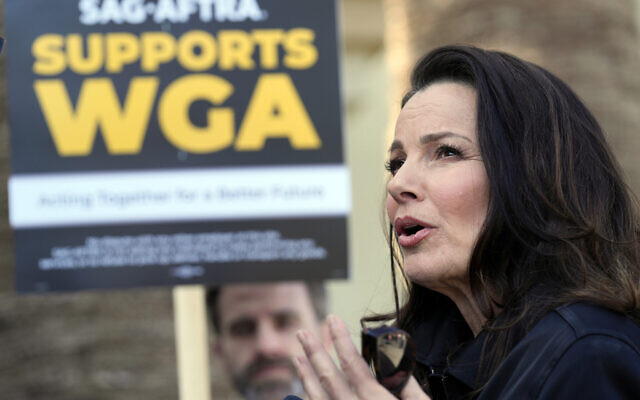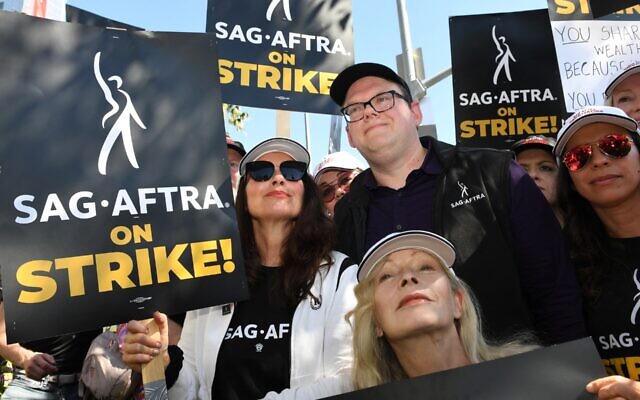SAG Strike Puts Brash Jewish President, Fran Drescher, Squarely in Spotlight
The union she has led since 2021, the Screen Actors Guild, has launched a strike over their treatment by studios in an age of digital streaming.

(JTA) — In the second season of “The Nanny,” the sitcom she wrote and starred in, Fran Drescher’s character, Fran Fine, refuses to enter a hotel where the busboys are striking.
“I’m sorry, but the Fines don’t cross picket lines,” she tells her companion, the father of the family she works for. “It’s against our religion.”
The laugh line was one of many moments when Drescher served her signature mashup of brashness, Jewishness and liberal politics throughout her early 1990s series and beyond.
Now, three decades later, Drescher is one of the most prominent advocates for organized labor — and it’s hardly a joke. The union she has led since 2021, the Screen Actors Guild, last week launched a strike over their treatment by studios in an age of digital streaming. Joining with the union representing writers, which is also on strike, the guild has effectively caused Hollywood to grind to a halt — and Drescher is leading the charge.
“What we ultimately received from them is what my mom would call ‘a leck and a schmeck,’” she said during a press conference last week, using the Yiddish for “a lick and a sniff” — meaning an amount so small one can barely smell or taste it — to refer to the offer from the Alliance of Motion Picture and Television Production.
In leading the 160,000-member union through the strike, Drescher joins a long list of Jewish women labor activists. In 1909, Clara Lemlich, a 23-year-old Jewish garment worker, gave an impassioned speech — also in Yiddish — that ignited a 20,000 person general strike consisting mostly of women, reshaping her industry and strengthening the power of unions.
The “Great Revolt,” referring to a separate 50,000-person, mostly male garment worker’s strike that followed, is seen as a watershed moment in labor history. “That’s really the critical thing: the women launch the Great Revolt,” said Pamela Nadell, director of the Jewish studies program at American University and author of “America’s Jewish Women: A History from Colonial Times to Today.”
Lemlich wasn’t alone. Around the same time, Rose Schneiderman, vice president of the New York chapter of the Women’s Trade Union League starting in 1908, was instrumental in the state’s passage of fire safety legislation in the wake of the Triangle Shirtwaist Factory fire in 1911. Bessie Abramowitz became one of the founders of the Amalgamated Clothing Workers Union, launching a major strike against menswear store Hart Schaffner and Marx.
More recently, the American Federation of Teachers, the second-largest teachers union in the United States and one of the top-10 biggest unions overall, has twice been led by Jewish women, including its current president, Randi Weingarten.

“What you’re seeing is a pattern that Jewish women in the labor force, when they have seen injustice, have stood up for it,” Nadell said. “Stories about Jewish women’s social justice activism… it’s passed on from generation to generation.”
Drescher was born and raised in Queens, New York to Sylvia, a bridal consultant, and Mort Drescher, a naval systems analyst. (Her character’s parents on “The Nanny” had the same names.) She told an interviewer that her father taught her to “refine what exists, not accept what is.”
Drescher’s Jewish identity has long been central to her on-screen characters. Throughout the show, Fran Fine teaches the Sheffield family Yiddish terms and the basics about Jewish holidays. The show has drawn criticism for perpetuating stereotypes of Jewish women who are whiny, obsessed with marrying doctors and always looking for a sale — but it also has enduring Jewish fans, including writer and actor Ilana Glazer, who cast Drescher as her aunt on “Broad City.”
In the 1997 romantic comedy “The Beautician and the Beast,” Drescher’s character, New York City beautician Joy Miller, ends up in a fictional Eastern European country ruled by a dictator named Boris Pochenko. In one scene, she tours a factory with the dictator and chats with a worker who expresses dismay that he will have to stay late to work and will miss dinner. She tries to assuage his concern by reminding him that he could still get overtime.
When he says he is unfamiliar with the concept, she gets a dreamy look in her eyes. She is then shown speaking passionately to the workers.
When Pochenko and Miller reunite outside, he lambastes her for acting out of turn.
“You know,” she replies, “I might have said the word ‘strike.’ I say a lot of things! Who listens?”
Drescher has received criticism for her stance against vaccine mandates in the film and television industry during her time as SAG-AFTRA president, though she says she has received all doses of the COVID-19 vaccine.
Days before the contract with the AMPTP was set to expire, Drescher was the focus of more criticism as reality TV star and businesswoman Kim Kardashian — whose net worth is around $1.2 billion, according to Forbes — shared a photo of the two of them together in Puglia, Italy, in the middle of guild negotiations. Kardashian has more than 362 million Instagram followers.
Drescher later clarified that she was in Italy for a work event related to her position as a brand ambassador for Dolce and Gabbana (she says she had not met Kardashian before they took the photo) and that the negotiating committee was aware of her attendance.
The strike is not the first time she has faced down the studios. Speaking on a Los Angeles magazine podcast in 2020, she said a network had initially pressed her to make the “Nanny” character Italian instead of Jewish. At first, she said, she considered making the switch to facilitate her big break — but she decided against it.
“I do not like living with regret, and I don’t want to rush into doing something to get the job and then when it doesn’t go right or it fails, I kick myself because I thought, ‘Why didn’t we follow our instincts? Why did we listen to them?’” she said on the podcast. “I thought, ‘I can’t live with that regret. I know this character needs to be written very close to me and all the rich and wonderful characters that I grew up with.’”
Referring to her co-writer and then-husband Peter Marc Jacobson, she went on: “Peter and I have a brand of comedy that’s rich in specificity, and not only couldn’t we have written it that way — if the character were Italian — but I couldn’t have performed it that way. So we kind of mustered up our chutzpah and said, ‘No, Fran Fine must be Jewish.’”
Now, Drescher is hoping that the same chutzpah will translate into a better deal for actors who say they are not being fairly paid for work that streams online. Key issues in the contract negotiations include “economic fairness, residuals, regulating the use of artificial intelligence and alleviating the burdens of the industry-wide shift to self-taping,” according to the SAG-AFTRA website. The AI proposal from AMPTP in particular has been a disturbing development to guild members.
“They propose that our background performers should be able to be scanned, get paid for one day’s pay, and their company should own that scan of their image, their likeness, and should be able to use it for the rest of eternity,” said SAG-AFTRA chief negotiator Duncan Crabtree-Ireland. “So if you think that’s a groundbreaking proposal, I suggest you think again.”
They propose that our background performers should be able to be scanned, get paid for one day’s pay, and their company should own that scan of their image, their likeness, and should be able to use it for the rest of eternity. So if you think that’s a groundbreaking proposal, I suggest you think again.
In June, nearly 98% of the guild’s members voted to authorize a strike, and the strike began on Friday. Not only are guild members prohibited from shooting, but they are also banned from promoting films and TV shows that have already been made, including through social media posts, participating in print and radio interviews, and making late night talk show appearances about their work. The actors’ strike is also occurring on the back of the Writers Guild strike, which began in May. Studios and the AMPTP estimate this strike will continue until October.
“The endgame is to allow things to drag on until union members start losing their apartments and losing their houses,” a studio executive told Deadline last week regarding the writers’ strike.
Drescher herself is also a member of the WGA, and in May she expressed solidarity between the two unions.
On moving forward with the actors’ strike, Drescher told the AP, “In earnest we extended, hoping that they would make deeper inroads, give us some meat on the bone so we can really have a meaningful conversation.”
“They locked themselves behind closed doors, they kept canceling our meetings and we thought, okay, maybe they’re really duking it out in there,” she added. “Maybe they’re gonna come back with something that we could really have a meaningful discussion. But we got bupkis,” she said, using the Yiddish word for zero. “And I think that we were duped.”



comments